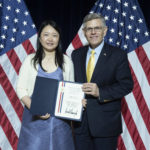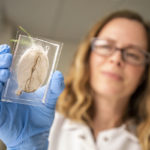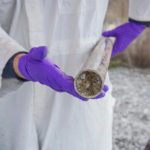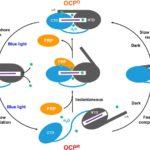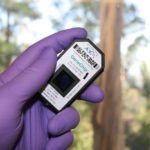Wenjun Zhang, a faculty scientist in Biosciences’ Environmental Genomics and Systems Biology (EGSB) Division and associate professor of chemical and biomolecular engineering at UC Berkeley, is among the 2019 winners of the Presidential Early Career Award for Scientists and Engineers. The prestigious award, established in 1996 and coordinated by the Office of Science and Technology Policy within the Executive Office of the President, is the highest honor bestowed by the United States government on early-career researchers.
EcoFABs: Fabricated Microbial Ecosystem Models to Advance Microbiome Research
Biosciences’ Trent Northen and Ben Brown, along with collaborators from more than a dozen institutions, co-authored a paper published in Nature Methods that outlines a vision for fabricated model microbial ecosystems (EcoFABs) and their potential impact on microbiome science.
Scientists Hit Pay Dirt with New Microbial Research Technique
In a Nature Communications report, a team of Berkeley Lab Biosciences Area scientists detail the first-ever successful use of a technique called BONCAT to isolate active microbes present in a sample of soil. Working within a Berkeley Lab-led scientific focus area called ENIGMA (for Ecosystems and Networks Integrated with Genes and Molecular Assemblies), Trent Northen’s lab in the Environmental Genomics and Systems Biology (EGSB) division teamed with JGI researchers on the work.
X-ray Footprinting Reveals Molecular Basis of Orange Carotenoid Protein Photoprotection
Researchers at Berkeley Lab and Michigan State University (MSU), led by Corie Ralston and Cheryl Kerfeld, performed X-ray footprinting mass spectrometry (XFMS) experiments at the Advanced Light Source (ALS) beamline 5.3.1, which revealed new mechanistic details of the key events in orange carotenoid protein (OCP) photoprotection. XFMS is ideally suited to probing conformational dynamics at the single residue level, providing both a spatial and temporal view of site-specific changes in the OCP and its interaction with the fluorescence recovery protein (FRP). The experiments showed that FRP provides an extended binding region that holds the OCP together and forces proximity of the two domains that accelerate relaxation of OCP to its native state.
PhyloChip Provides Clarity Amid Hawaiian Water Contamination Concerns
To better understand the cause of high counts of potentially pathogenic fecal indicator bacteria (FIB) in the watersheds of the Mahaulepu Valley and Waikomo Stream in southeast Kauai, the Hawaii Department of Health (DOH) commissioned a study by Berkeley Lab microbial ecologists Gary Andersen and Eric Dubinsky. The duo is frequently invited to lead microbial water assessment projects thanks to their expertise and the PhyloChip, a credit card-sized microbial detection technology invented by Andersen and others at Berkeley Lab.
- « Previous Page
- 1
- …
- 21
- 22
- 23
- 24
- 25
- …
- 46
- Next Page »
Was this page useful?


